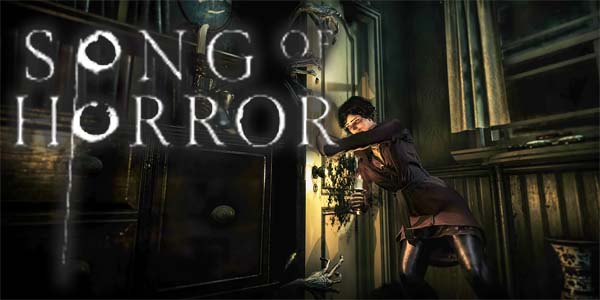
Not only is it really great to play an indie horror game that captures the slow and thoughtful nature of old-school survival horror, but it's also refreshing to play a good old fashioned gothic horror game. So many indie horror games come off as feeling a bit pretentious with their reliance on suppressed guilt twists for their psychological horror plots. Song Of Horror bucks that trend by being a straight-forward horror story about haunted houses, possessed artifacts, and otherworldly mysteries.
Song Of Horror also ups the stakes by featuring a cast of multiple playable characters, each of whom can be killed off (and removed from the rest of the story) if the player screws up. So not only do we literally not know what eldritch abomination may lie around any given dimly-lit corner, or behind any creaky old door, but if you're not careful, whatever is around that corner or behind that door might put a premature end to a given character's life and story.
Strut and fret your hour upon the stage, and then ...
Song Of Horror was originally sold as an episodic indie horror game on Steam, but the collection of all episodes was released for console as a single game in 2021. It somehow slipped under my radar until last month, when YouTube recommended a video about it by Mert Kay Kay. Each episode includes 3 or 4 playable characters to choose from, each of whom can be permanently killed off if you fail to avoid or escape from the phantasms that haunt each episode. If a character dies, all the items and notes that they've collected will be dropped on the floor at the spot of their death, and that location will be marked on the next character's map. So you don't really lose any progress if a single character dies. If you lose all the characters in a given episode, however, then it's "Game Over"!
Each episode will introduce one or more new characters, but old characters can also re-appear as playable characters if they survived the previous episode(s). Thus, losing a character in an early episode may have the longer-term consequence of reducing the player's available lives (to borrow a term from old arcade parlance) for future episodes, and reducing your margin of error.
Each episode has 3 or 4 playable characters, each of whom can permanently die.
But even if you do manage to screw up and get all 4 characters killed in any given chapter, you only have to restart that chapter. Song Of Horror won't delete your save file and force you to redo the entire game. Each chapter takes 2 -- maybe 3 -- hours to complete on a first-playthrough, and can be done in well under an hour if you know what you're doing. It's actually a loss of progress that is somewhat on par with dying in an old Resident Evil game after doing a fair chunk of exploration without backtracking to a save point.
The legitimate threat of permanently losing a character will naturally raise the stakes of the game and of the horror. It will force the player to play cautiously, to be observant of your surrounding and of context clues in the environment, to pay close attention to sounds and shadows, and to not barge through every door in a rush. In fact, it may do this more effectively than even a game like Resident Evil. Dying doesn't mean simply restarting with the same character and retrying the set piece that got you killed. Dying means permanently losing that character, and having to try again with a new character. Restarting at a checkpoint doesn't simply reset the stakes, it doubles-down on them!
Furthermore, the actual jump scares and dangers are semi-randomized. You won't necessarily encounter the same jump scare or the same monster at the same place and time in any 2 playthroughs. This also keeps things tense, because even on a replay (whether it be a whole new playthrough, or just a respawn with a different character), you can't just memorize all the places to avoid.
[More]
0ffa3716-e34f-4cd6-a026-763157eedc54|0|.0
Tags:Song of Horror, Protocol Games, Raiser Games, horror, cosmic horror, gothic horror, H.P. Lovecraft, perma-death, music, sound, light, dark, Silent Hill
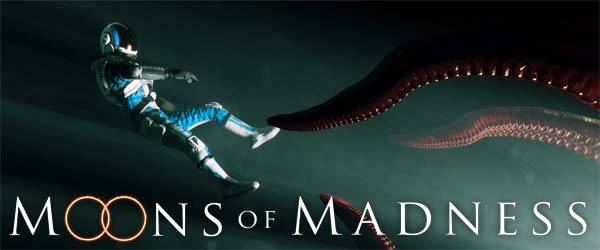
It's hard to make a good Lovecraftian horror game. The key to Lovecraft's horror was the mysterious intractability of his cosmic abominations. It wasn't just that they were ugly or deadly; the horror came from the realization that these monsters were part of a much greater cosmos that humans can barely comprehend, and that we are little more than ants to these god-like beings who could snuff us out of existence at a whim -- if they even cared enough about us to do so. In the century since Lovecraft wrote his stories, Lovecraft's monsters have become so iconic that Cthulhu is pretty much a universally-recognized, cliche monster along with the likes of Dracula and the Xenomorph. The closer a story adheres to Lovecraft's ideas, the more familiar it becomes, and the harder it is to create that sense of being overwhelmed with unfathomable knowledge that drives a person insane.
That is why I think that FromSoftware's Bloodborne is perhaps the best video game adaptation of Lovecraft's concepts (even though it is not a direct adaptation of any of his stories). Bloodborne's esoteric and arcane lore, and the indirect nature in which it communicates its backstory, actually does create that sense that the player is just a small piece of a much larger puzzle that you will never fully comprehend. And the difficult nature of the game means that the player certainly feels like you can be snuffed out of existence at any moment.
Moons of Madness isn't mysterious, or arcane, or particularly threatening. It's cliche and predictable to a fault.
Flatline
I saw almost every plot point coming from a mile away, and if you don't want spoilers, then I suggest you skip ahead to the next section. I didn't expect there to be a full-on underground lab complex akin to Resident Evil 2, but it wasn't something that came off as very surprising considering how telegraphed the corporate conspiracy "twist" was from the start. All the other twists, however, came off as rote and stale. The science experiment gone haywire, the relief ship crashing, the reveals about the protagonist's family history, the multiple betrayals ... none of it came off as even remotely surprising, and the whole game degraded to simply waiting for the next shoe to drop. The game isn't very long, but the predictable nature of its plot made it feel like it was dragging on for much longer than its six-ish hour playtime.
The secret lab was not a surprise and only distracted from the cosmic horror.
Worse yet, the corporate conspiracy stuff ended up distracting from, and drowning out, the Lovecraftian cosmic horror. The monsters don't feel mysterious because they're all the results of experiments being done at the request of the evil corporation. The Lovecraftian temple complex and "dreamers" fall flat because their existence is spoiled much earlier in the game. Heck, the other characters visit the temple and tell you all about it over the radio, while you're fumbling about the silly underground lab, so by the time you get to the temple, it's not mysterious at all. I think the point was to try to convey the awe and wonder of the NPC characters in the hopes that it would instill a sense of awe and wonder within the player, but all I could think was "I'd much rather be playing as those other characters right now!"
When all is said and done, I feel like Observation (despite not being directly inspired by Lovecraft's mythos) pulls off the cosmic horror shtick much better because its alien influences remain mysterious and intractable all the way through the end -- perhaps to that game's fault.
... [More]
942aeb04-c29d-447b-8525-5e4dcfd19326|0|.0
Tags:Moons of Madness, Steam, Rock Pocket Games, Dreamloop Games, Funcom, science fiction, horror, cosmic horror, H.P. Lovecraft, walking simulator, Mars, conspiracy
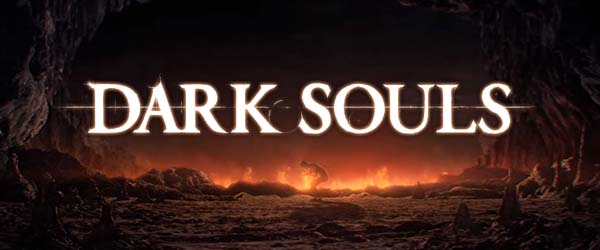
I'm going to do something that I don't normally do, which is to muse a little bit on the theories of other fans. Normally, when I write these lore posts, I write about what I believe - my own personal interpretation. In this case, however, I stumbled upon a video and a blog written by two different users that posit two entirely different (and probably contradictory) fan theories regarding the Souls games. Both theories piqued my interest and lead me down a rabbit hole of my own thought and speculation. So I'm going to summarize the theories that these two have pitched, and also throw in my own thoughts.
But first, let's review the conventional Dark Souls wisdom of the cycles of Fire and Dark. According to conventional wisdom, the dragons and archtrees of the Age of Ancients existed at the genesis of the world. The fire then appeared and ushered in the Age of Fire, but the fire faded, and the Age of Dark began. Lord Gwyn sacrificed himself to rekindle the flame and renew the Age of Fire, but it eventually faded again, leading to an Age of Dark. And the world continued in this endless cycle of the fire
fading and then being rekindled.
An overarching cycle of world-creation?
First, I'll start with a video by The Ashen Hollow, which is about the Cycle of Ages, and which speculates that the Soul of the Lords and Age of Dark ending establishes that the Age of Dark eventually gives way to yet another Age of Ancients. This creates a cycle of cycles, in which not only does the world of Dark Souls repeat Ages of Fire and Ages of Dark, but that once that cycle has run its course, it repeats yet another cycle of world-creation. Dark Souls III, therefore, takes place at the end of an Age of Fire, but it also takes place at the tail end of a cycle of world-creation and destruction. So Dark Souls III is a sequel to the first Dark Souls, and also the first Dark Souls is - in a sense - a sequel to Dark Souls III.

"Soul of the Lords.
One of the twisted souls, steeped in strength.
Use to acquire numerous souls, or transpose to extract it's true strength.
Since Lord Gwyn, the first Lord of Cinder, many exalted lords have linked the First Flame, and it is their very souls that have manifested themselves as defender of the flame."
When the fire inevitably fades, there will be an Age of Dark. This we know. The entire game series, so far, has been about perpetuating this Age of Fire for as long as possible in order to avoid the Age of Dark. Though the first and third game gives us the explicit option to initiate an Age of Dark, it's unclear if that ever actually happens in the canon of the series. And even if it does, the ending of Dark Souls II establishes that either course of action will just result in that chosen age cycling back to the other. We've never actually seen a proper Age of Dark, so we know little of what it would be like. Perhaps the Age of Dark is not permanent. According to the Fire Keeper (if given the Eyes of a Fire Keeper), the Age of Dark is not completely without fire, for there will be little embers dancing in the distance, left to us by past lords. [More]
f4e772f4-cf45-45f5-a271-3c8dd01253f5|3|5.0
Tags:Dark Souls, lore, Age of Ancients, Age of Lords, Age of Fire, Age of Dark, Age of the Deep Sea, cycle, prophecy, Dark Soul, humanity, Furtive Pygmy, Gwyn, first flame, Kiln of the First Flame, archtree, Archdragon Peak, dragon, puss of man, light, dark, Soul of Lords, Ebrietas, Seath the Scaleless, Patches, Moonlight Greatsword, Marvelous Chester, Oceiros, Demon's Souls, Bloodborne, Old One, fog, soul, blood, The Ashen Hollow, James Wynne, H.P. Lovecraft, Armored Core, King's Field
Now that Dark Souls is supposedly over (pending the inevitable DLC for Dark Souls III), it's time to wonder what new games From Software and Hidetaka Miyazaki might decide to make. Will they continue to make Souls-like games (ala Bloodborne)? Will they go back to older IPs like Armored Core or King's Field? All indications seem to point towards the company going back towards making mech games along the lines of Armored Core (though it may be a new IP).
I've played some of the Armored Core games, and I actually really liked some of the PS1 / PS2 - era games. But I would actually much rather see the company try their hand at something different. I'd like to see this company (under Miyazaki's direction) take a stab at a genuine horror game.
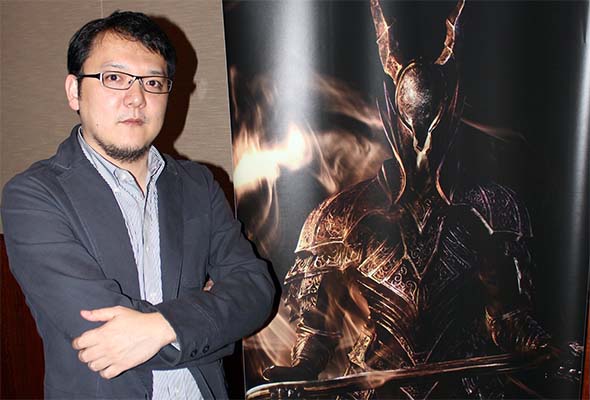
Miyazaki has said that Dark Souls is likely over. So what's next for his company?
They've already played around with some horror concepts in some of the Souls games. Levels like the Tower of Latria and Valley of Defilement in Demon's Souls had genuinely frightening atmospheres. The Dark Souls games also had their share of some horror-inspired levels. Sen's Fotress and Tomb of the Giants have the pacing of a horror level. And of course, Bloodborne was a whole game inspired by Gothic horror and Lovecraft.
Granted, these games were all hack-and-slash action games, rather than genuine horror games, but ... [More]
dc7859e5-750b-4d0a-8b97-ea244ddeecd1|1|5.0
Tags:Hidetaka Miyazaki, From Software, Armored Core, Dark Souls, Demon's Souls, Bloodborne, Tower of Latria, Valley of Defilement, Sen's Fortress, Tomb of the Giants, horror, medieval, fantasy, gothic horror, H.P. Lovecraft, environmental story-telling, world-building
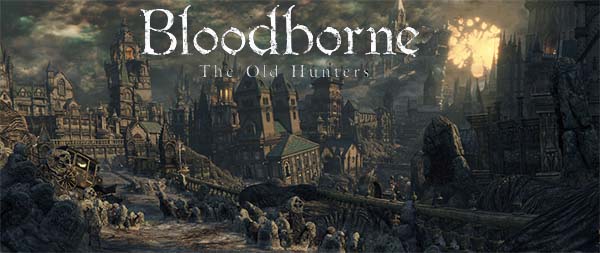
The DLC level for Bloodborne is considerably easier to access than the DLC of the first Dark Souls. You only have to beat a mid-game boss, and the items that you need to access the DLC are literally just handed to you next time you visit the Hunter's Dream. Unfortunately, if you don't read the pop-up text that tells you where to go to access the DLC level, then you might be in trouble, as there's no other indication in the game of where to go. Not even in the item description of the trinket that grants access. In typical FROMSoft fashion, accessing the DLC is fairly obscure and un-intuitive. In fact, it's even more obscure than Dark Souls because it isn't something that the player is likely to accidentally stumble upon. It requires players to do something that they might actively avoid attempting to do because it's something that probably got them killed in the base game. Granted, there is one other situation in the base game in which you are teleported to an optional location by this same method, so it's not entirely unprecedented, but it still feels contrived. Look FROMSoft, if you have to explicitly tell the player where to go in a text prompt, rather than allowing the player to infer it based on textual or environmental clues, that's probably a sign that you made it too esoteric...
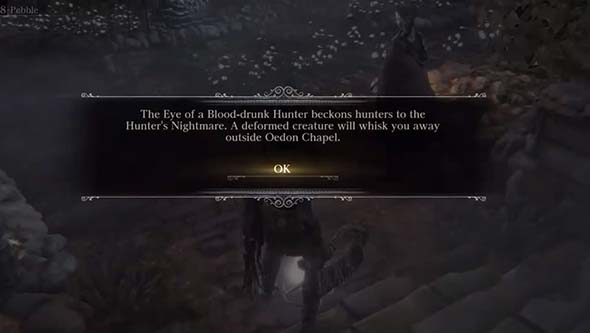
The DLC doesn't require players to jump through as many hoops as Artorias of the Abyss required,
but the actual entry-point into the DLC is even more obscure and counter-intuitive.
Once you're in the DLC's "Hunter's Nightmare" area, you'll be provided with a seemingly much more technical challenge than Dark Souls' Artorias of the Abyss DLC. While Artorias DLC threw a lot of magic-casting enemies at me that required me to cheese my way through the levels by using ranged weapons or mob-baiting tactics to cut down enemies one-by-one while staying out of range of the casters, Bloodborne's The Old Hunters DLC instead pits me in more one-on-one battles with fellow hunters that require more careful technique in order to vanquish. In fact, these encounters kind of subvert one of the common criticisms of the Souls games, which is that enemies are too easy to bait, and fighting one-on-one trivializes most fights. The mob monsters in the Hunter's Nightmare actually back away from you as if they're scared, and the other hunter enemies will actually kill those monsters for you, setting the stage for these one-on-one fights. I hope you've been practicing parrying, visceral attacks, and dashing towards enemies in the base game, because this DLC will test those skills. They aren't as obscenely difficult as the NPC hunters that you can find in the chapel of the Unseen Village or in the courtyard on the side of the Grand Cathedral (opposite the path to the Forbidden Woods), but they can easily destroy you if you overreach or get arrogant.
Or at least, most of the hunters aren't that difficult. There are a few notable hunters that posed quite a challenge. One pair of hostile church agents caused me quite a bit of trouble with the camera and target lock, since one was a ranged spell-caster, and the other was an in-your-face swordsman. These issues were exacerbated by the presence of environmental decorations that kept getting between my character and the camera, and thus blocking my view of the action. It always annoys me when game designers put challenges in the game that the mechanics are ill-equipped to deal with. It's something that Bloodborne and the Souls games rarely fell victim to (other than the occasional tight-roping and platforming), so it's really noticeable when it does happen.
This wheelchair enemy would sometimes wind up on the moving stairs and turn invisible.
There was also a recurring glitch ... [More]
4e2bcc7f-ea9e-450f-a108-f054dad07aa4|1|5.0
Tags:Bloodborne, the Old Hunters, From Software, PS4, Sony, PSN, DLC, expansion, hunters, insight, Yharnam, whirligig saw, gatling gun, weapon, league, covenant, co-op, H.P. Lovecraft
|

| 12 | | | | | | | 60 | | 11 | | | | | | | 55 | | 10 | | | | | | | 50 | | 09 | | | | | | | 45 | | 08 | | | | | | | 40 | | 07 | | | | | | | 35 | | 06 | | | | | | | 30 | | 05 | | | | | | | 25 | | 04 | | | | | | | 20 | | 03 | | | | | | | 15 | | 02 | | | | | | | 10 | | 01 | | | | | | | 05 |
|